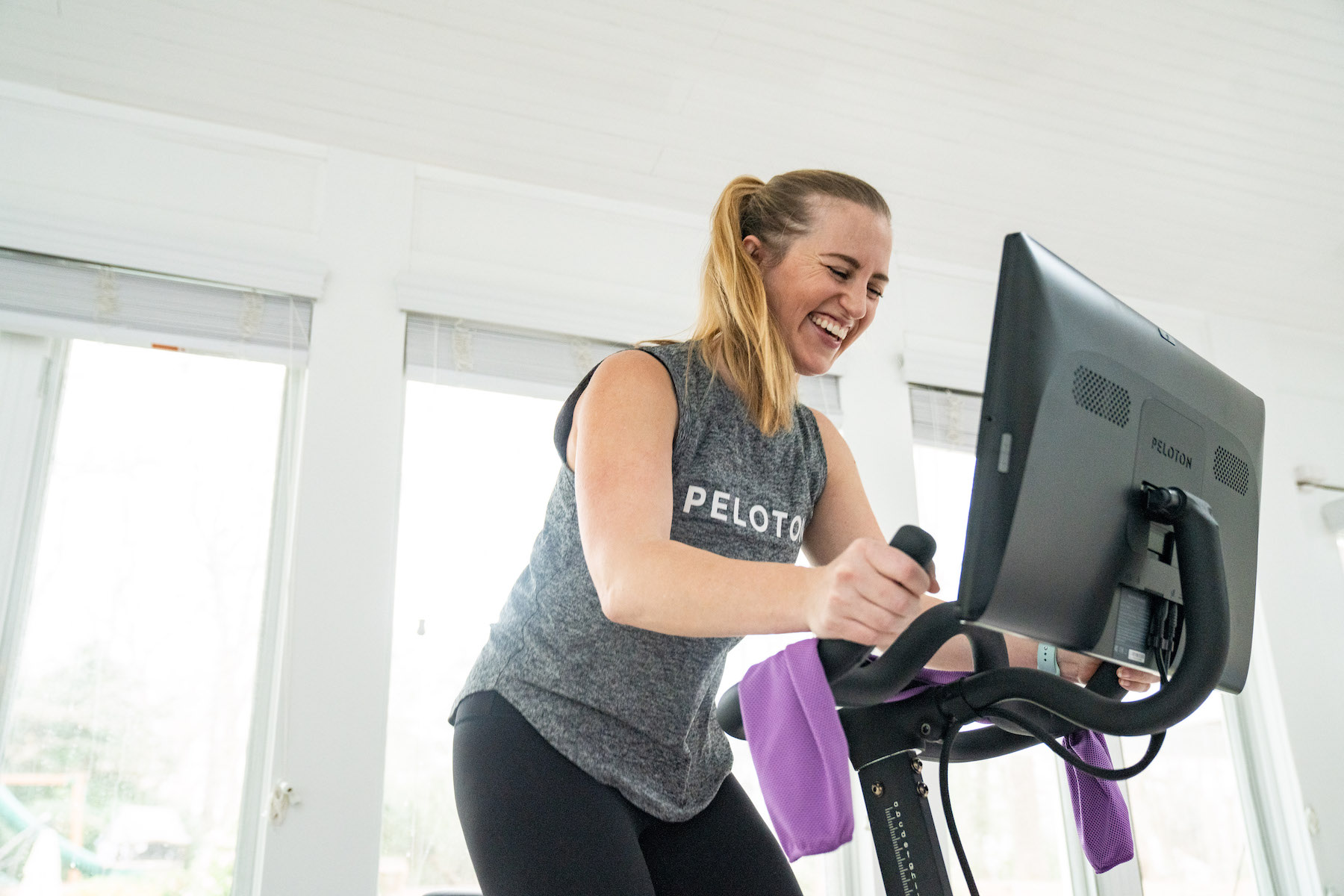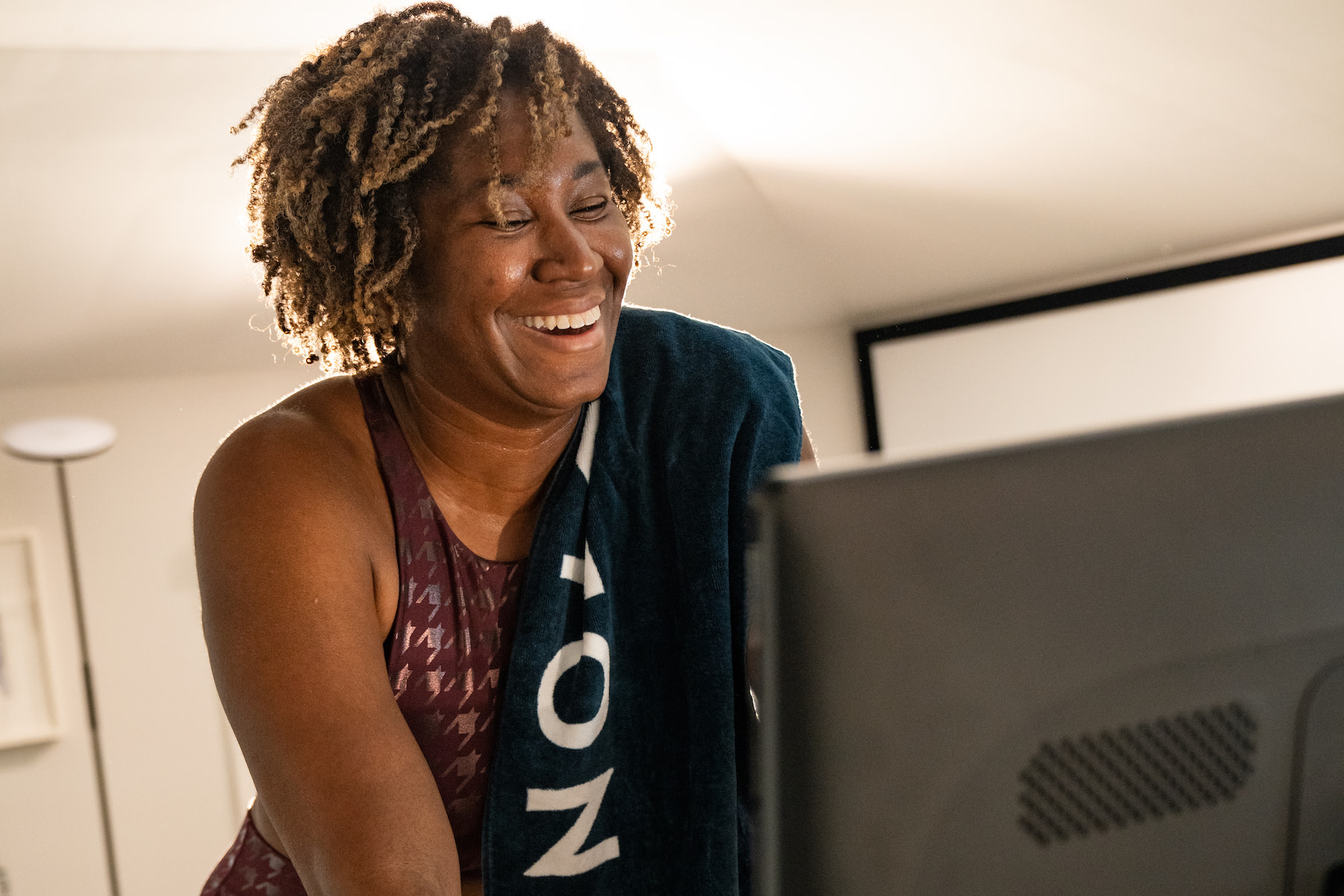
Finding Your 'Thing' Can Make All the Difference In Your Workout Routine. Here’s How.
Exercising shouldn't suck. Finding a workout you actually enjoy makes it fun—here's how to do it.
By Lauren Mazzo•
Have you ever described yourself as “not a workout person”? Well, Peloton Instructor Jess King doesn’t buy it. Fitness, the act of moving, isn’t an aesthetic or a trend; it’s something that every human body needs. “The reason we move our bodies is because our bodies need us to move them to stay healthy and to feel good, period,” Jess says.
If a workout routine has never clicked for you, it’s likely because you haven’t found a workout you truly enjoy.
“If you enjoy your workout, it becomes a positive part of your lifestyle, not a chore,” says Sabrena Jo, PhD, senior director of science and research at the American Council on Exercise. “This shift in perception can significantly affect how consistently you engage in the exercise over the long term.”
If you’ve tried tons of workouts, but don’t feel like you’ve found “the one” that doesn’t mean fitness isn’t for you. It just means you haven’t found your “thing” yet.

Why Finding Your Workout “Thing” Is Magic
“Enjoying your workout leads to higher levels of quality motivation (sometimes called intrinsic or autonomous motivation), meaning you're exercising because you find it personally rewarding, not just for external rewards like weight loss or muscle gain,” explains Jo. “This intrinsic motivation is a stronger, more sustainable driver of consistent behavior.” Translation: You’ll actually stick with it.
Research also shows that enjoying your workout is directly linked to better adherence. In a 2015 study published in Psychology, exercisers who experienced more positive feelings during a training session were more likely to stick with their workout program.
Moreover, “enjoyment in your workout can lead to a state known as ‘flow,’ a psychological state where you are fully immersed and engaged in the activity,” Jo adds. “This state not only enhances the quality of your workout experience but also promotes mental well-being.”
How to Find Your Workout “Thing”
If you’ve started and stopped a gym membership too many times to count or have a laundry list of abandoned New Year’s resolutions, you may feel like it’s a lost cause. But finding your workout “thing” is possible, and these tips from Jess will help you get there.
Connect to Your Inner Child
Jess recommends starting with this simple thought exercise: “Remember the ways that you liked to play as a kid. How did you like to move? Were you running? Was it a sport? Were you a climber?” she says. “Consider what you might like and how that would translate to the fitness landscape or your life now.”
Also consider the way your favorite childhood activities stimulated your brain. Did you enjoy a sport because you’re competitive? Did you love being on a team for the social aspect? Did you always want to play outside? “I was a dancer, so I liked moving to music,” Jess says. “But my brain really appreciated the challenging patterns and having to remember choreography and then translate that into my body. Something about that connection between my mind and body felt super resonant for me.”
Experiment
Jess’s next tip is to experiment—and the Peloton platform is ideal for that. Take a bunch of classes, whether it’s something you’re familiar with, like running or indoor cycling, or something you’ve never done before, like rowing, Pilates, or boxing. Maybe it’s not a workout class and more of an activity, like pickleball or rock climbing.
“If you're having fun and it feels like you're doing an activity, it's still a workout if you're engaging your body and getting your heart rate up,” Jess says. It’s OK for your “thing” to be unconventional or a combination of different activities, Jo adds. Varying your routine, getting out of a gym environment, and working out at home, or nature could be just what you need to spark joy.
Give a Workout a Couple of Tries
If you try a workout and hate it, don’t write it off immediately. Too often, people quit because they don’t like being a beginner or feeling bad at something—but there’s empowering growth to be found there.
“What you're experiencing with that initial resistance oftentimes is your own ego, your own insecurities of feeling like: I don't belong here. I'm an imposter,” Jess says. “It happens to everyone… give yourself a chance to get over yourself and experience the workout.”
Comfort and enjoyment often increase with familiarity and skill, Jo adds. “However, if the workout is consistently unenjoyable, causes discomfort or dread, or doesn't align with your personal goals and values, it's better to try different activities. The key is to listen to your body and mind; exercise should be challenging but not demoralizing or distressing.” If you’re feeling unsafe or like you’ll get injured, those are also good reasons to walk away, Jess says. But if something is simply hard for you, use that as motivation rather than an excuse to stop.
Take Jess’s personal experience with running as an example. “I don't like it because it's so hard for me,” she says. “Instead of that being the reason I'm not going to do it, that’s a reason to pursue it.” If you avoid running or another workout because it’s hard, it holds power over you. “For me to reclaim that narrative and my power, I confront it,” Jess explains. “I might not like it, but it's important for me to know I can do it.” Rather than backing down from the challenge, consider tackling it smartly. For example, Jess started with beginner classes and only running a minute or two at a time.
“It's okay to be a beginner, to stay curious,” Jess says. “Manage your expectations. If it's something new, something hard, or you're building a new skill, stick with it.” Good chances are, you’ll come away fitter, stronger, or faster, feeling empowered and with a real sense of accomplishment.
Check Your Mindset
If you hated your first barre class, don’t go into the second one assuming you won’t enjoy it, either. “I feel strongly that what you put into the experience of finding your thing, how open you are, how generous you are with your energy, with your heart, you're going to receive that back,” Jess says. If you walk into a workout already pessimistic about the experience because you've taken one of these before and it’s “not your thing,” you’re almost guaranteed to have a bad time.
Pause, and try to shift your self-talk. Instead, say: “I have a lot to offer. I’m here. I have good vibes. I'm excited. I'm a beginner. That's okay,” Jess says. “Pay attention to your inner voice because it's going to dictate so much of your experience.”

The Instructor and Music Set the Mood
During a guided workout class, the instructor can make or break your experience. You may not hate yoga; you might just not feel connected to the person calling out the flow. “Find an instructor that you not only resonate with but admire,” Jess says. “I think it's important that they be aspirational in some way, whether it's how they live their life or the kind of energy they bring into a room.” Peloton is the perfect place to see this in action; try a new workout modality with a few different instructors and notice who you vibe with most.
Music is a game-changing part of the workout experience, too, Jess says. Research shows that workout music improves enjoyment and performance and that the latter effect is markedly stronger when it’s music you like. Find an instructor who plays your genre, try an Artist Series with your favorite band, or take a moment to curate your workout playlist when sweating on your own. “Find music that you really like so that you feel connected to what you're doing,” Jess says.
Find Your Community
Road cycling solo might feel like a drag—and even a bit nerve-racking—while cycling with a pack (even a virtual one) could make you feel alive. When trying to find the workout that speaks to you, don’t discount the role other people can play in your experience.
“Working out, especially if it's new for you, can be intimidating. So finding someone to not only keep you accountable but also to empathize and share in the experience with you can be very rewarding, fulfilling, and make you feel less alone,” Jess says. Reap the benefits from a single person, like a run buddy, or a whole community of people, whether IRL or on a virtual leaderboard.
Jo agrees. “Don't underestimate the power of social support. Engaging in physical activities with friends or a supportive community can enhance enjoyment and motivation, making it more likely for you to stick with your routine.” Research has proven the effect; community engagement increases adherence to exercise programs, and having a workout buddy (IRL or virtual) increases motivation to work out longer and at a higher intensity.
Finally, Allow Yourself to Have Seasons
Once you find your “thing,” it can be tempting to hold onto that identity for life—but you don’t have to, and it’s probably not a good idea.
“I think stagnation breeds stank energy no matter what,” Jess says. “We are seasonal. Our biology is seasonal. Our environment is seasonal. This idea that we will be one way for an entire year, much less a decade or a lifetime, is unrealistic. Our bodies ebb and flow.”
You could pick up running during the spring and summer, then fall into an indoor rowing routine when the weather gets cold. Or you crank through HIIT classes in your 20s, then settle into slower strength work in your 30s. As long as the constant is moving your body, you should feel free to follow what brings you joy at different moments in your life.
“The practice of moving, loving yourself, and staying healthy is not seasonal. How you do it can change,” Jess adds. “Lighten the grip on what you think you know and what you think is best, and give yourself a chance to add more of what you love… over time, it will become a lifestyle.”

Peloton App
Access thousands of classes with no equipment needed.
This content is for informational and educational purposes only and does not constitute individualized advice. It is not intended to replace professional medical evaluation, diagnosis, or treatment. Seek the advice of your physician for questions you may have regarding your health or a medical condition. If you are having a medical emergency, call your physician or 911 immediately.
Level up your inbox.
Subscribe for a weekly dose of fitness, plus the latest promos, launches, and events.
By providing your email address, you agree to receive marketing communications from Peloton.
For more about how we use your information, see our Privacy Policy.








